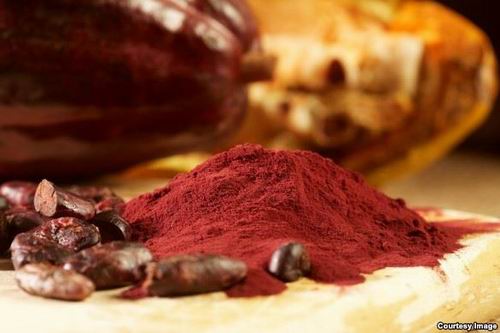参考译文
Chocolate Improves Memory and Heart Health
巧克力提高记忆力和心脏健康
 |
|
Flavanol, a naturally occurring antioxidants found in cocoa, reversed age-related memory decline in healthy older adults in a recent study. (Photo courtesy of Mars, Inc., the chocolate company who helped to fund the study.) |
From VOA Learning English, this is the Health Report.
这里是美国之音英语学习的健康报道。
Can eating a chocolate bar every day really prevent age-related memory loss?
每天吃条巧克力就能阻止随着年龄的增长而导致的记忆力衰退?
No.
不。
Can eating chocolate cake for breakfast, lunch and dinner be good for your heart?
早餐、午餐和晚餐吃巧克力蛋糕对心脏有益处吗?
Again, the answer is no.
答案也是否定的。
That would be too good to be true.
吃巧克力不可能达到那么多效果。
But new research shows that large amounts of flavanols, substances found in cocoa, tea and some vegetables, may reverse age-related memory failure. Another study is looking to see if high levels of cocoa flavanols can help prevent heart attacks and strokes.
但是最近新研究表明:在可可、茶和一些蔬菜中发现大量黄烷醇类物质,可扭转随着年龄增长而导致的记忆力衰退。另一项研究在试验优质的可可是否能够阻止心脏病和中风的发作。
Flavanols found in dark chocolate are known to increase blood flow in the part of the brain that controls memory. They also help prevent heart disease by lowering blood pressure and “bad” cholesterol.
黑巧克力中的黄烷醇有助于增进大脑内控制记忆的那部分神经的血液流动。黄烷醇还能够通过降低血压和胆固醇来减少心脏病的发作。
A new study published online in Nature Neuroscience found that cocoa flavanols reverse minor memory loss in older adults. A company that makes chocolate helped to pay for the study.
在自然神经学期刊上发表的最新研究发现可可黄烷醇能够保留一些老年人的一小部分记忆。一家生产巧克力的公司赞助支持这项研究。
Can chocolate improve memory?
那巧克力能提高记忆力吗?
Brain processes decrease as we age. By the time we reach our 50s and 60s we may have trouble remembering simple things such as the names of new people we meet or where we put our car keys.
随着我们年龄的增长,大脑的思维过程会减退。我们到了五六十岁的时候,也许连记住别人的名字或者把钥匙放在哪儿了这样最简单的记忆都会有问题。
 |
|
Dr. Scott Small, Director of the Alzheimer's Disease Research Center at Columbia University |
Dr. Scott Small is a professor of neurology at Columbia University in New York City. He is the lead writer of a research paper describing the effects of cocoa flavanols on brain activity.
斯格特博士是纽约市哥伦比亚大学神经科的教授。他的研究论文表述了可可黄烷醇对大脑活动的影响。
The study involved 37 volunteers aged between 50 and 69. Researchers gave them a high-level flavanol drink made from cocoa beans or a low-level flavanol drink. For a period of three months, some subjects got 900milligrams of flavanol a day. The others got 10milligrams of flavanol each day.
这项研究有37位年纪在50岁到69岁不等的志愿者参与,研究者给他们来自可可豆中含量高的黄烷醇饮料和黄烷醇含量低的饮料。经过三个月的试验:一些人每天获得900毫克的黄烷醇。而其它一些人每天摄入10毫克的黄烷醇。
Brain imaging and memory tests were given to each study subject before and after the study. Dr. Small says that the subjects who had the high-level flavanol drink showed much improvement on memory tests.
研究前后都会对测试者进行脑成像和记忆力测试。斯马尔博士说喝黄烷醇含量高的饮料的人在记忆力测试中,记忆力有所提升。
Four-year study to dig deeper into healing powers of flavanol
四年的研究继续深入探索黄烷醇的治疗功效。
The researchers warn that more work is needed because this study was performed on a small group. Researchers at Brigham and Women’s Hospital in Boston, Massachusetts recently announced plans to do just that.
研究者称还需要继续研究,因为这项研究只是针对一小部分人群。波士顿布里格姆女子医院的研究者宣布一项计划要扩大研究范围。
Dr. JoAnn Manson is the lead researcher of a four-year study involving 18,000 adults. This study will use flavanol capsules.
约翰·曼森博士是这项研究的主管研究员,这项研究历时四年,包括1万8千个成人。研究会使用黄烷醇胶囊。
“This capsule of cocoa flavanols will avoid having the calories and the sugar and the saturated fat found in chocolate.”
“可可黄烷醇胶囊不含有巧克力中的卡路里、糖分和饱和脂肪。”
The study subjects will be divided into two groups and will take two pills a day. The capsules will all look the same. But, one group’s capsules will contain flavanols. The other group will take capsules made of an inactive substance, or placebo.
研究课题会分为两组,每组一天会吃两粒胶囊。两粒胶囊看起来相似,实际上只有一个里面含有黄烷醇,而另一个里面的成分是非活性物质或者安慰剂。
Dr. Manson says that a person would have to eat ten times a normal amount to get the flavanols in just one flavanol pill.
马尔森博士表示:实验者吃一片黄烷醇胶囊所含的量是吃普通巧克力的十倍。
“The amount of chocolate that it would take in order to have this amount of cocoa flavanols would be more than ten times the amount that people would ordinarily eat.”
“为了获得这种可可黄烷醇,人们需要食用的巧克力数量是正常人通常食用的10倍多。”
But Dr. Small says people should not necessarily start eating more chocolate. He says a person would have to eat a huge amount of chocolate to get the level of flavanol given to the test subjects. He also says many manufacturers remove the flavanols from their chocolate products.
然而,斯马尔博士称人们没必要开始吃更多的巧克力,只有参与这次测试试验的人可以多吃一些巧克力,获取试验所需的黄烷醇含量数据。但是,很多生产商把巧克力产品中的黄烷醇成分去掉。
Dr. Small says a cocoa-based flavanol extract may be developed in the future. He says that more studies are needed to see how much flavanol is good for human health.
斯马尔博士说未来有可能会研发可可黄烷醇提取物,还需要更多的研究来试验到底服用多少黄烷醇对人体有益。
I'm Anna Matteo.
我是安娜·马特奥。
______________________________________________________________
Words in This Story
reverse – v. to cause (something, such as a process) to stop or return to an earlier state
cholesterol – n. a substance that is found in the bodies of people and animals
neurology – n. the scientific study of the nervous system especially in respect to its structure, functions, and abnormalities
capsule – n. a very small container that is filled with medicine and swallowed whole
placebo – n. a pill or substance that is given to a patient like a drug but that has no physical effect on the patient
extract – n. a substance that you get from something by using a machine or chemicals
听力原文
Chocolate Improves Memory and Heart Health
 |
|
Flavanol, a naturally occurring antioxidants found in cocoa, reversed age-related memory decline in healthy older adults in a recent study. (Photo courtesy of Mars, Inc., the chocolate company who helped to fund the study.) |
From VOA Learning English, this is the Health Report.
Can eating a chocolate bar every day really prevent age-related memory loss?
No.
Can eating chocolate cake for breakfast, lunch and dinner be good for your heart?
Again, the answer is no.
That would be too good to be true.
But new research shows that large amounts of flavanols, substances found in cocoa, tea and some vegetables, may reverse age-related memory failure. Another study is looking to see if high levels of cocoa flavanols can help prevent heart attacks and strokes.
Flavanols found in dark chocolate are known to increase blood flow in the partof the brain that controls memory. They also help prevent heart disease bylowering blood pressure and “bad” cholesterol.
A new study published online in Nature Neuroscience found that cocoa flavanols reverse minor memory loss in older adults. A company that makes chocolate helped to pay for the study.
Can chocolate improve memory?
Brain processes decrease as we age. By the time we reach our 50s and 60s we may have trouble remembering simple things such as the names of new people we meet or where we put our car keys.
Dr. Scott Small is a professor of neurology at Columbia University in New York City. He is the lead writer of a research paper describing the effects of cocoa flavanols on brain activity.
The study involved 37 volunteers aged between 50 and 69. Researchers gave them a high-level flavanol drink made from cocoa beans or a low-level flavanol drink. For a period of three months, some subjects got 900milligrams of flavanol a day. The others got 10milligrams of flavanol each day.
Brain imaging and memory tests were given to each study subject before and after the study. Dr. Small says that the subjects who had the high-level flavanol drink showed much improvement on memory tests.
Four-year study to dig deeper into healing powers of flavanol
The researchers warn that more work is needed because this study was performed on a small group. Researchers at Brigham and Women’s Hospital in Boston, Massachusetts recently announced plans to do just that.
Dr. JoAnn Manson is the lead researcher of a four-year study involving 18,000 adults. This study will use flavanol capsules.
“This capsule of cocoa flavanols will avoid having the calories and the sugar and the saturated fat found in chocolate.”
The study subjects will be divided into two groups and will take two pills a day. The capsules will all look the same. But, one group’s capsules will contain flavanols. The other group will take capsules made of an inactive substance, or placebo.
Dr. Manson says that a person would have to eat ten times a normal amount to get the flavanols in just one flavanol pill.
“The amount of chocolate that it would take in order to have this amount of cocoa flavanols would be more than ten times the amount that people would ordinarily eat.”
But Dr. Small says people should not necessarily start eating more chocolate. He says a person would have to eat a huge amount of chocolate to get the level of flavanol given to the test subjects. He also says many manufacturers remove the flavanols from their chocolate products.
Dr. Small says a cocoa-based flavanol extract may be developed in the future. He says that more studies are needed to see how much flavanol is good for human health.
I'm Anna Matteo.
Anna Matteo wrote this story for Learning English. It was based on reports from VOA correspondents George Putic and Matthew Hilburn. Caty Weaverwas the editor.
______________________________________________________________
Words in This Story
reverse – v. to cause (something, such as a process) to stop or return to an earlier state
cholesterol – n. a substance that is found in the bodies of people and animals
neurology – n. the scientific study of the nervous system especially in respect to its structure, functions, and abnormalities
capsule – n. a very small container that is filled with medicine and swallowed whole
placebo – n. a pill or substance that is given to a patient like a drug but that has no physical effect on the patient
extract – n. a substance that you get from something by using a machine or chemicals







